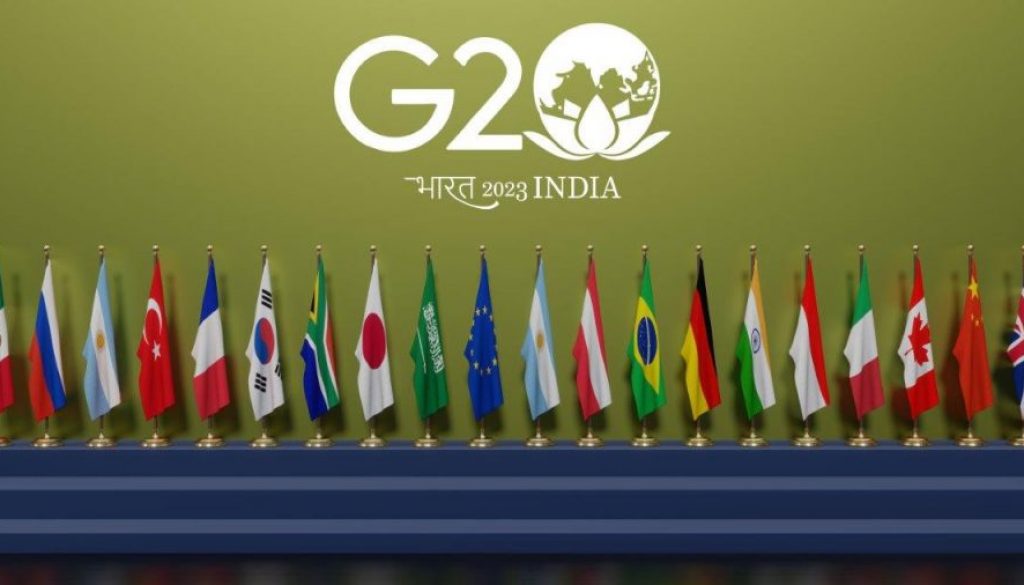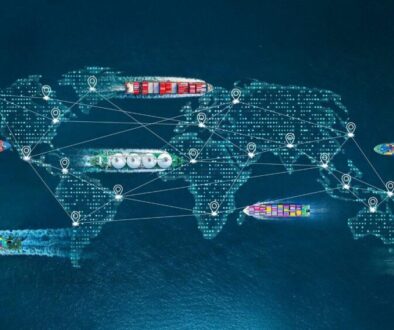BY DR SOHA MAAD
Introduction
With the global economy facing uncertainty and instability, the role of the Group of Twenty (G20), as a platform connecting the world’s major developed and emerging economies, is gaining a greater significance in shaping global trends. The G20 Presidency of India in 2023 is focusing on issues of critical global importance and is promoting sustainable growth and financial stability. It is addressing a number of global challenges such as reform of multilateral institutions, climate change, and fight against technology driven terrorism. The rise of the G20 represents a significant development on the global economic horizon.
This article presents an overview of G20 covering its historical evolution, its members and guest countries, how it works, and its various activities. Following this overview, the article traces the roadmap to the Indian presidency of the G20, starting from the G20 presidency of Saudi Arabia in 2020, presidency of Italy in 2021, presidency of Indonesia in 2022 to the current presidency of India in 2023. Then the article focuses on the priorities of the Indian presidency of G20, including priorities for finance ministers and central banks governors, fighting corruption, promoting the digital economy, building the infrastructure for the cities of tomorrow and the digital public infrastructure, and regulating crypto assets. The article concludes with recommendations for aligning Arab banks strategies with G20 presidency priorities.
About G20
Historical Evolution.
The G20 was founded in 1999 after the Asian financial crisis as a forum for the Finance Ministers and Central Bank Governors to discuss global economic and financial issues.
The G20 Summit is held annually, under the leadership of a rotating Presidency. The G20 initially focused largely on broad macroeconomic issues, but it has since expanded its agenda to include trade, sustainable development, health, agriculture, energy, environment, climate change, and anti-corruption.
G20 Members
The Group of Twenty (G20) comprises 19 countries (Argentina, Australia, Brazil, Canada, China, France, Germany, India, Indonesia, Italy, Japan, Republic of Korea, Mexico, Russia, Saudi Arabia, South Africa, Turkey, United Kingdom and United States) and the European Union. The G20 members represent around 85% of the global GDP, over 75% of the global trade, and about two-thirds of the world population.
Guest Countries
G20 guest countries are Bangladesh, Egypt, Mauritius, Netherlands, Nigeria, Oman, Singapore, Spain, and United Arab Emirates (UAE).
How G20 Works
The G20 was born out of a meeting of the grouping of seven of the world’s advanced economies (G7) finance ministers and central bank governors who saw the need for a more inclusive body with broader representation in addressing the world’s financial challenges.
The G20 established the Financial Stability Board (FSB) to coordinate and monitor efforts in strengthening financial regulation. Through the years, the G20 remained committed to the principles of “strong, sustainable, balanced and inclusive growth”. The G20 has made a major contribution to setting the global governance agenda.
The G20 Presidency steers the G20 agenda for one year and hosts the Summit. The G20 consists of two parallel tracks: the Finance Track and the Sherpa Track. Finance Ministers and Central Bank Governors lead the Finance Track while Sherpas lead the Sherpa Track after Finance Track.
Within the two tracks, there are thematically oriented working groups in which representatives from the relevant ministries of the members as well as from invited guest countries and various international organisations participate.
The Finance Track is mainly led by the ministry of finance. These working groups meet regularly throughout the term of each presidency.
In addition, there are Engagement Groups which bring together civil societies, parliamentarians, think tanks, women, youth, labour, businesses and researchers of the G20 countries.
G20 Meetings
The G20 Meetings comprise of the following meetings:
- Meeting of Finance Ministers and Central Bank Governors (twice a year)
- Meeting of G20 Deputies
- G20 Ministerial Meeting on Development
- G20 Summit Meeting
The G20 summit meeting is preceded by meetings of working groups, Sherpa meetings, Finance meetings, Engagement Group meetings and then finally the Leaders’ Summit meeting. There is a B20 (for business), C20 (for civil society), L20 (for labour groups and unions), S20 (for scientific and academic community), T20 (for think tanks and research institutions), W20 (for women’s groups) and Y20 (for youth leaders).
The Roadmap To Indian Presidency Of G20
The Indian Council of World Affairs produced a paper on the roadmap to Indian presidency of G20. The paper traced the evolution of the G20 presidency from Saudi Arabia in 2020, to Italy in 2021, Indonesia in 2022, to India in 2023.
The report highlighted the growing role of the G20 and the wide set of issues on its agenda ranging from financial stability, debt burden, sustainable development goals, health crisis to food security.
The G20 Presidency is a very significant moment in India’s history. Since Independence, India has engaged with multilateral institutions, and contributed to combating the challenges of contemporary global governance.
The Italian Presidency in 2021 focused on People, Planet and Prosperity. The Indonesian Presidency in 2022 focused on Recover Together, Recover Stronger. In 2020, the G20 presidency of Saudi Arabia led the global fight against the COVID-19 pandemic with a United States Dollar USD 10 trillion bailout package that focused on addressing the economic and health crisis. Over the past 15 years, the G20’s agenda has expanded to include various issues affecting the financial markets, trade, health care, education, anti-corruption, women’s development, skill building and youth promotion.
In 2016, the G-20 committed itself to the Action Plan on the 2030 Agenda for Sustainable Development including the Sustainable Development Goals (SDGs) and the Addis Ababa Action Agenda on Financing for Development (AAAA). The 2030 Action Plan envisaged bold transformative steps through both collective and individual concrete actions at international and domestic levels. The G20 further sought to improve sustainable livelihoods with its endeavours in energy and climate.
The Saudi Arabia G20 Presidency in 2020
The G20 Riyadh Summit was held in 22 November 2020. An extraordinary G20 Leaders’ Summit was held on March 26, 2020. The COVID-19 pandemic and its unprecedented impact in terms of lives lost, economies affected necessitated significant multilateral efforts to find timely responses. The G20 had to address the financing gaps in World Health Organization WHO’s Strategic Preparedness and Response Plan, to ensure an inclusive recovery that tackles inequalities and ensure a sustainable future.
The Saudi Presidency took up the initiative to enhance access to pandemic tools. Saudi Arabia contributed USD 500 million to the immediate funding needs to fight the COVID-19 pandemic, with the G20 member countries pledging USD 21 billion to finance the fight against the pandemic. G20 also committed to work on affordable and equitable access to COVID-19 vaccines, therapeutics and diagnostic tools.
The G20 Italian Presidency in 2021
The Rome G20 Summit was held on 30 and 31 October 2021, in Italy. The Italian Presidency took the lead in:
- Evolving a swift international response to the pandemic.
- Rapid recovery beyond the crisis, towards reducing inequalities, women’s empowerment, younger generations, protecting the most vulnerable by creating new jobs, social protection and food security.
- Maintaining sustained prosperity harnessing the main drivers of growth and innovation, bridging the digital divide and making digitalization an opportunity for all, improve productivity.
The G20 Indonesian Presidency in 2022
In 2022, there were signs of a slowdown in the globalization efforts. The world has witnessed the tragic humanitarian crisis in Eastern Europe as a consequence to the war in Ukraine, the western sanctions against Russia, lockdowns in China including in key manufacturing hubs that has severely impacted the global economy. The Indonesian Presidency of the G20 recognized that the world is in need of more collective action and inclusive collaboration amongst the major developed countries and emerging economies. The G20 Indonesian Presidency was based on the theme of “Recover Together, Recover Stronger”. The priority issues for the Indonesian Presidency were Global Health, Architecture, and Digital Transformation, and Sustainable Energy Transition.
The Indian G20 Presidency in 2023
The Indian G20 presidency focuses on the following issues:
- Calling on the international community to provide Afghanistan with immediate and unhindered access to humanitarian assistance.
- Tackling the problem of black money and tax avoidance.
- Equitable access to COVID-19 vaccines.
- Enlarging the capital base of multilateral development banks to support infrastructure needs of developing countries.
- Promoting transparency and integrity with zero tolerance policy on corruption and black money.
- Increasing labour mobility and skill portability.
- Setting target goals for the transition to clean energy, renewable energy, reduction in cost, and universal access through technology transfer and financial support.
- Calling for a comprehensive global framework for security to combat terrorism.
- Global cooperation in securing cyber space and minimizing the use of internet and social media for terrorist activities.
Priorities Of India G20 Presidency In 2023
India is holding the Presidency of the G20 from December 1, 2022 to November 30, 2023. The 43 Heads of Delegations, the largest ever in G20 will be participating in the final New Delhi Summit in September 2023.
The theme of India’s G20 Presidency is “One Earth, One Family, One Future” affirms the value of all life (human, animal, plant, and microorganisms). The theme also spotlights LiFE (Lifestyle for Environment), with its associated, environmentally sustainable and responsible choices.
A new working group on Disaster Risk Reduction is established under India’s Presidency to encourage collective work by the G20, undertake multi-disciplinary research and exchange best practices on disaster risk reduction.
India G20 Presidency is hosting over 200 meetings in over 50 cities across 32 different workstreams. The Indian G20 presidency has also planned a year-long India Experience’ for G20 member countries, special invitees, and others.
Priorities on the agenda of the Indian presidency of G20 in 2023 include:
- Green Development, Climate Finance and LiFE: climate change is a key priority for India’s presidential Presidency, with a particular focus towards not only climate finance and technology, but also ensuring just energy transitions for developing nations across the world.
- Accelerated, Inclusive and Resilient Growth: An accelerated, resilient and inclusive growth is a cornerstone for sustainable development. During its G20 Presidency, India aims to focus on areas that have the potential to bring structural transformation. This includes an ambition to accelerate integration of micro, small or medium-sized enterprises in global trade, bring in the spirit of trade for growth, promote labour rights and secure labour welfare, address global skills gap, and build inclusive agricultural value chains and food systems.
- Accelerating progress on Sustainable Development Goals (SDGs): India’s G20 Presidency focuses on recommitting G20’s efforts to achieving the targets laid out in the 2030 Agenda for Sustainable Development.
- Technological Transformation and Digital Public Infrastructure: India G20 Presidency is promoting a human-centric approach to technology, and facilitating greater knowledge-sharing in priority areas like digital public infrastructure, financial inclusion, and tech-enabled development in sectors ranging from agriculture to education.
- Multilateral Institutions for the 21st century: India’s G20 priority will be to continue pressing for reformed multilateralism that creates more accountable, inclusive just, equitable and representative multipolar international system that is fit for addressing the challenges in the 21st century.
- Women-led development: India hopes to use the G20 forum to highlight inclusive growth and development, with women empowerment and representation being at the core of India’s G20 deliberations.
Priorities For Finance Ministers And Central Bank Governors
The Prime Minister of India, Shri Narendra Modi addressed the first meeting of Finance Ministers and Central Bank Governors under India’s G20 Presidency via video message. The following key points were emphasized in his message:
- The role of leading economies and monetary systems of the world in bringing back stability, confidence and growth to the global economy.
- Focus on the most vulnerable citizens of the world.
- Global economic leadership to win back the confidence of the world by creating an inclusive agenda.
- Promoting an inclusive vision: One Earth, One Family, One Future.
- Leadership of global finance and economy at a time when the world is facing serious economic difficulties.
- Achieving Sustainable Development Goals.
- Strengthening Multilateral Development Banks for meeting global challenges like climate change and high debt levels.
- Exploring and harnessing the power of technology while developing standards to regulate possible risk of destabilization and misuse in digital finance.
- Creation of a highly secure, highly trusted, and highly efficient public digital infrastructure in the digital payment ecosystem.
- Embracing digital payments.
- Sharing digital experience with the world and the G20.
Anti-Corruption
The First Anti-Corruption Working Group Meeting (ACWG) of G20, took place on the 1st to 3rd March, 2023. G20 Nations discussed areas of future action like bringing in processes, where fugitive economic offenders can be traced and extradited faster, and their properties situated abroad brought within the reach of the law of the land from which such offenders escape.
Digital Economy
The First G20 Digital Economy Working Group (DEWG) meeting in India concluded with setting the tone for a productive and meaningful deliberations for the future DEWG meetings. The meeting showcased India’s digital transformation journey, and brought together G20 members, key knowledge partners, and guest countries to discuss digital public infrastructure, Cybersecurity, and digital skilling. The meeting focused on the priority of Digital Skilling. India proposed mechanisms for digitally skilled future ready workforce. Summary discussions were also held on three key priority areas namely Digital Public Infrastructure (DPI), Cyber Security in Digital Economy and Digital Skilling.
Infrastructure For Cities Of Tomorrow
The first G20 Infrastructure Working Group meeting under G20 India Presidency concluded on 17th January 2023. The two-day meeting discussed the flagship theme of “Financing Cities of Tomorrow: Inclusive, Resilient and Sustainable”. The meeting included discussions on various facets of making cities economic centres of growth, financing urban infrastructure, building future-ready urban infrastructure, the role of cities in meeting sustainability targets, directing fiscal investments for unlocking private financing for energy-efficient and environmentally sustainable infrastructure and mitigating social imbalances.
The meeting also discussed other important themes, such as exploring ways to collate the data on Infrastructure spending and make the data useful for the private sector.
A High-Level Workshop on “Financing of Cities of Tomorrow” was also held. The Workshop discussed how the cities of tomorrow must tie together their key administrative functions, planning, funding, and financing to increase private sector participation.
Digital Public Infrastructure
A High- Level Symposium on Digital Public Infrastructure (DPI) was held on February 23 2023. The Symposium addressed the following key issues:
- How digital innovations have emerged as a great leveller and enabler of growth and the evidence that DPI are one of the most transformational digital innovation.
- The roles and examples of Indian DPI in developing a new approach to solving societal and service delivery problems leading to cost savings for governments, increased transparency and accountability and encouraging access to finance and innovations.
- The potential of DPI in leading to growth and empowerment of people through increased accessibility, inclusion, accountability and productivity gains.
- The contribution of DPI for expanding the reach of government and private sector
- Leveraging DPI for inclusive growth and development
- The potentials of DPI for leading to innovative, resilient, and inclusive growth while providing a means for efficient governance.
The G20 India Presidency has also constituted a Task Force on Digital Public Infrastructure for Economic Transformation, Financial Inclusion and Development.
The Road To Policy Consensus On Crypto Assets
Digital technology is playing an important role in achieving this goal, by transforming the financial sector, boosting financial inclusion, and improving financial market efficiency. The Indian Presidency’s priority on the financial sector regulatory reforms in 2023 is to make the digital financial system more efficient, secure, and stable.
Despite the rapid evolution of the crypto universe, there is no comprehensive global policy framework for crypto assets. Given the concerns over greater interconnectedness between crypto assets and the traditional financial sector as well as the complexity and volatility around crypto assets, policymakers are calling for tighter regulation. The global standard-setting bodies, such as the FATF (Financial Action Task Force), FSB (Financial Stability Board), CPMI (Committee on Payments and Market Infrastructures), IOSCO (International Organization of Securities Commissions) and BCBS (Basel Committee on Banking Supervision) have been coordinating the regulatory agenda, while working within their respective institutional mandates.
Shaping Global Policy Dialogue On Crypto Assets
The Indian G20 presidency India broadened the G20 discussion on crypto assets beyond financial integrity concerns. It addressed the macroeconomic implications and widespread crypto adoption in the economy, highlighting the need for a data-based and informed approach to the global challenges and opportunities of crypto assets
The International Monetary Fund (IMF) revealed the consequences of crypto adoption on the internal and external stability of a country’s economy as well as on the structure of its financial system. It highlighted the benefits of crypto assets including cheaper and faster cross border payments, more integrated financial markets, and increased financial inclusion, but these are yet to be realised.
The Indian G20 Presidency and the IMF addressed the challenge of the global information gaps pertaining to the crypto asset universe and the need to build a deeper understanding of the interlinkages, opportunities and risks pertaining to crypto assets.
The following key issues were highlighted:
- The need for a common taxonomy and a systematic classification of the crypto asset universe.
- Identification of benefits and risks of crypto assets.
- Development of macroeconomic policies for crypto assets.
- Ensuring financial stability and adequacy of regulatory responses.
- Resolving the issue of the highly centralised nature of the crypto universe despite the claim that it is a decentralised platform.
- The costs and benefits that crypto assets create for the real economy.
- The need to establish clear regulatory perimeters for new financial technology (FinTech) innovations.
- The lack of governance structures in the crypto universe.
- The need to look at alternate solutions to address existing challenges in global financial and payment
- The consequences of crypto assets on the broader economy.
- The role of crypto assets are the optimal solution for existing challenges in global financial
Aligning Arab Banks Strategies With G20 Presidency Priorities
In light of the growing role of the G20 presidency and its priorities that are shaping world economies, Arab banks and authorities are recommended to align their future strategies with the following important priorities set under G20 presidencies:
- Developing the digital economy.
- Developing the digital public infrastructure.
- Developing the cities of tomorrow.
- Regulating digital assets and capital flows.
- Developing a common framework in facing crisis.
- Addressing climate change
- Supporting the decarbonisation of the economy.
- Protecting vulnerable people.
- Global governance.
- Climate financing.



